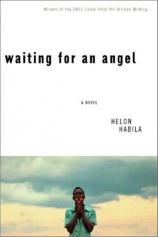Reading Group Guide
Discussion Questions
Waiting for an Angel

1. In his afterword, Helon Habila writes that Nigeria in the 1990s was "a terrible time to be alive." How effective is Waiting for an Angel in painting a mood of chaos and despair? Which scenes are most pivotal in conveying such a mood?
2. Despite the oppressive circumstances shaping the lives of his characters, Habila's novel is not bleak or depressing; it manages to sustain an undefeated spirit. How? Which characters and scenes evoke a lighter mood or represent the possibility of a brighter future?
3. Consider the women depicted in the novel: Janice, Alice, Hagar, Nancy, Auntie Rachael. Do you think them strong characters? From where do they get their strength? How do they see and navigate the world differently than do the male characters?
4. Habila has said that he wrote Waiting for an Angel in short-story form so that he could feel a sense of accomplishment after completing each one. What other reasons might he have had for choosing to construct his novel in this fashion? How important is the novel's fragmented structure to the telling of Lomba's story? How is the experience of reading interconnected stories different than that of reading a more conventional novel? How does this novel compare to other novels about war and social unrest that you might have read?
5. Muftau, the superintendent at Lomba's prison, courts Janice using Lomba's verse, which Lomba eventually borrows from other poets. Is Muftau's courtship essentially fraudulent? Which is more important in a relationship, honesty or depth of feeling? Would Muftau have won over Janice without using Lomba's words? What is the future of Muftau and Janice's relationship?
6. Janice, the teacher, cannot save Lomba, despite being moved by his plight. How is this helplessness symbolic of the novel as a whole? What other examples does Habila give us of humanity juxtaposed with despair?
7. Lomba's friend asks the fortune teller to tell him when he is going to die because, he says, "I want to be ready." Given the opportunity, would you rather have this knowledge, or not? While the fortune teller does not provide specifics, Lomba's friend nonetheless "knows" when and where the Angel of Death is coming for him. Is his instinct correct, or does he instead hasten his own death by rushing toward it? Do you believe in fate?
8. Listening to Percy Sledge's "When a Man Loves a Woman," Alice asks whether Lomba believes "a man in love is so naïve." When the two meet again at the hospital, Alice tells Lomba that "I don't play those records any more, I gave them all away." What is the role of music and of literature throughout the novel? Does Alice's not listening to soul music anymore represent a radical shift, or were the seeds of that change present previously? Why does Habila choose soul music to represent the transformation in Alice, and is it an apt analogy?
9. Do you disapprove of Alice's decision to marry for money, or does she have no other choice? Is Alice's sacrifice worth it? In a situation like Alice's, is it ethically wrong, or merely realistic, to choose practicality and loyalty over love and passion?
10. The residents of Lomba's old neighborhood change the name of their street from Morgan Street to Poverty Street. "That name [Morgan] is too grand for us," Joshua Amusu says. "We are a poor, neglected people. . . . We do not know who Morgan is or was, but we do know what Poverty is." What power is there in names, and in the ability to name? How will the new name cause others to view the neighborhood, and the residents to view themselves? Does it suggest resignation or protest?
11. The teacher Joshua Amusu steps up to lead what he hopes will be a peaceful demonstration against a corrupt government. Yet as James Fiki, editor of The Dial, tells Lomba, "[Joshua] knows that in our country there cannot be a peaceful demonstration, the troops will always come, there will be gunshots, and perhaps death. He knows that, I am sure, but he is still willing to do it. The time has come when a few bruises, even deaths, don't matter any more." By sympathizing with Joshua's leadership of a demonstration that will clearly end in tragedy, does this novel excuse violence? At what point does oppression justify violent resistance—or does it ever? Should the Poverty Street demonstration, which results in the arrests and deaths of several protestors, be considered a failure?
12. Throughout Waiting for an Angel, the importance of words is manifest in the writings of the prisoner Lomba, the shutting down of Nigeria's newspapers, the oppression of speech at the Poverty Street demonstration, the silencing of Lomba's rommate Bola, and the hanging of writer Ken Saro-Wiwa. How does the stifling of expression compare with other forms of punishment and oppression? Why is freedom of speech considered so vital? How might these examples from the novel be compared with events from history or with current political events?
13. Lomba dreams of being a novelist, but he works as a journalist. Which tells the greater truth: fiction or journalism? Why does Lomba feel as though he has come up short of his goals? How can he accomplish more as a journalist? As a novelist? Why is being a writer of fiction considered the "greater" profession? (Or is it?)
14. Joshua Amusu is respected when it comes to teaching and leading, but some consider him foolhardy when it comes to his "secret obsession," Hagar. What is it about Hagar that appeals to Joshua? Would a relationship between a prostitute and a teacher be realistic? The novel touches upon several other romantic relationships: those of Alice and Lomba, Alice and her fiancé, Muftau and Janice, Auntie Rachael and her husband, Nancy and Mark. Which of these relationships seem to you to be the most positive? Why or why not? How does Habila's portrayal of romance reflect upon themes of the book?
15. Why does Habila narrate the Poverty Street section through the eyes of a teenager? How is Kela changed by his time living on Poverty Street?
16. Writing in the newspaper The Guardian, Maya Jaggi has said of Waiting for an Angel, "Lomba's fate is uncertain, but Habila leaves us a chink of hope, just as he leaves space for irony, love, heartbreak and humour as the punches rain down." Is humor appropriate in this novel? What effect does it have? What do the various characters do with the hope that is given to them? Do you think Lomba survives after the narrative leaves him?
Waiting for an Angel
- Publication Date: August 8, 2012
- Hardcover: 256 pages
- Publisher: W. W. Norton & Company
- ISBN-10: 0393051935
- ISBN-13: 9780393051933







